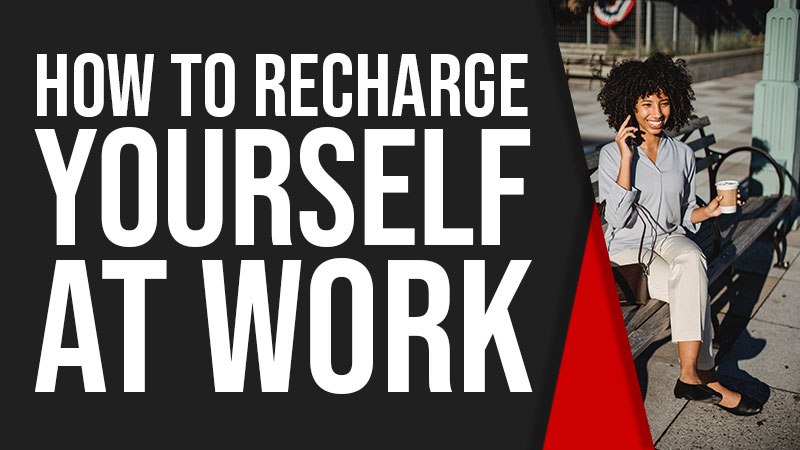9 Proven Ways How to
Recharge Yourself At Work
Share this content :

Picture this: you’re at your desk and the clock is about to strike 2:30 PM. You’ve been hard at work for the last few hours, typing away at your keyboard and speaking to your manager. As you start to make your next report, you suddenly let out a yawn. As if by magic, your eyelids get heavy and you feel like you need to lie down. Before you know it, you give in and let your head rest against the table as you slowly, quietly, drift off into a mid-work nap.
The scary thing about this scenario is that it happens a lot. On average, Americans spend about ten hours a day working. Whether you take it in shifts or one long, arduous day, it’s those kinds of those that can leave you out of energy. It’s no wonder why people find it so hard to stay awake after being busy for five or six hours straight.
The real question to ask is: why does this keep happening? You might think that it’s just a rare occurrence or a lack of coffee, but even daily coffee drinkers get that sleeping bug. Commonly, the afternoon hits a lull in your energy levels. You wouldn’t be the first person to need some energy back. Why is that so? To find out, here’s what you should know about being tired at work and how to recharge yourself at work immediately!
Why do I feel tired at work?
Feeling tired at work might sound like a normal thing. So many people dread Mondays because they know that once it’s time to wake up, it’s back to the grind. However, there’s a difference between working hard and working too hard. Without you knowing it, there are ways that the workplace can make you feel so tired and out of energy even if you just woke up from a nap. Here are some ways that you can feel tired at work.
You’re working too often.
The first and most common reason that people get tired at work is that they’ve been doing it too much. People who don’t take regular breaks, let alone vacations or downtime, are going to feel perpetually tired. You might know of someone who never seems to put down their laptop or phone, just because they got “work to do”. Even if it’s way past the end of their shift, these people keep exhausting themselves because they can’t seem to stop. While it may seem funny in the movies, being a workaholic is anything but fun. If you don’t know how to stop or how to recharge yourself at work, you risk losing too much energy to go through the day.

You’re working too much.
Another reason you might feel overworked is that you’re tasked with so much stuff. There’s a reason why managers and supervisors look so tired or stressed out; that’s because they have a lot of things to cover. It’s like being a parent, in that you have to divide your time and attention between many things at once. What’s worse is that some workers aren’t even compensated for the extra labor, whether that’s small errands for their colleagues or corrections for big projects.
You’re not getting enough rest.
In either of the previous problems, you probably aren’t getting enough rest. You might be one of the many Americans who spend their nights awake, either to try and enjoy their time off work or to catch up with any overdue tasks. 40% of workers in the US don’t have enough adequate sleep. Even if your rest time is something else, like eating lunch or taking a nap, it can be hard to focus when you spend all that time working.
You’re feeling monotonous.
Ironically, there are times when working too little can be a serious problem. You might scoff and think that such an idea is a daydream, but it’s true. There are jobs where the tasks never seem to change, no matter what day or week it is. Sometimes, knowing how to recharge yourself at work also means keeping things fresh and exciting. If you get too used to a routine, you might lose all motivation.
For example, imagine that your job is to spell out the numbers one to one thousand. It may sound simple, but imagine doing that for a two-year contract. Not only does that sound very boring, but if you’re not given chances or opportunities to do other things, you might tear your hair out from boredom and frustration.
You’re thinking about work a lot.
Some people don’t know how to turn their professional lives off. What should be a focus for 9-5 becomes a 24-hour constant. While it’s impossible to completely shut off work from the mind, these people can’t seem to put their priorities elsewhere. What’s worse is that even those who try to sleep it off or relax with friends might still have lingering questions in their head, all about the work they’ve done or have to do.
You’re feeling burnt out.
Lastly, the reason you’re feeling tired at work could simply be that you’re at the end of your rope. Burnout and work fatigue is a serious problem that affects many workers in and out of the office. Those who suffer burnout tend to be more exhausted and unhappy at their jobs. That’s why it’s also important to know how to recharge yourself at work.
What’s worse is that burning out might not even be recognized in some companies as a serious problem. Remember that mental health is a serious thing, and if work is causing too many problems, it might be a sign that your mental health needs some help.
How can I recharge at work?
Now that you’ve seen the ways people get tired at work, either knowingly or unknowingly, it’s important to know how to recharge. In many ways, our brains are like phone batteries; at some point, you’ll need to give your mind time and rest to re-energize. To help you out, here are nine proven ways you can recharge while at work.
1. Set work-life boundaries.
First and foremost, it’s always important that you know where your work life begins and ends. The most problematic lifestyles can start just because someone doesn’t stay away from work. You’ve heard the term from divorcees and ex-spouses that their partners were “married to their job”. That kind of life can cause serious issues like work fatigue and emotional burnout.
If you want to start learning how to recharge yourself at work, you should know when to turn your brain off. It might not be easy at first, but having time to say no to anything work-related is important. Remember, your life doesn’t stop even when you leave the office. Make the most of it by learning to say no or silencing any calls and emails related to work after the shift ends.
2. Switch your tasks or pace.
According to Elizabeth Grace Saunders, who wrote about task-switching in FastCompany, some of the greatest violinists in the world practice only four hours a day. Those four hours then get broken down into two-hour shifts. While that may sound short or impractical, these short hours can yield the most effort and payoff in your life.

Compared to that, many office workers try to go eight full hours with intense and busy workloads. Not only is that impractical, but it can make you and your coworkers exhausted before lunchtime.
To know how to recharge yourself at work, you should also know when you feel the most effective.
So, to get the work done without exhausting yourself, learn how to pace yourself first. Not every hour has to be intense or burdensome; the intense hours will need your full focus and attention. One principle you can follow is the 80-20 rule. Otherwise known as the Pareto principle, it states that 80% of all your output comes from 20% of the work. In other words, a lot of your goals or tasks for the day can be met if you devote 20% of your time and patience to fulfilling them.
3. Look for your productive periods.
Just as the body has periods when it is fully awake and when it needs sleep, it also has periods where it feels completely focused and when it needs rest. As you can imagine, your body can’t sustain eight full hours of hard work. Instead, it’s more likely that there are peaks in the day, the times when you feel the most active and alert.
These peaks are what you’re trying to find and use to your advantage. If you want to get 80% of the work done, look for these periods. They can happen before lunch, after a quick nap, or even at the very start of the shift. Once you use these peak periods to do as much work as possible, you can let yourself relax and slow down; for example, after spending two hours writing an intensive report, you can spend the next two on simpler tasks, like checking your emails or messaging clients.
4. Move around.
Most people at work, especially those with office-based spaces or cubicles, are going to be sitting most of the time. That can spell disaster for both your posture and your energy levels. It’s hard to feel motivated or get focused at work when you’ve been sitting down for so long.
To help you get a quick boost of energy, start by taking walking breaks. Sometimes, all you need is a quiet stroll to learn how to recharge yourself at work. Think of them as light exercises tor body move around and get some fresh air. The movement is an energy booster by itself; it’s why exercise is recommended for people who want to stay awake and alert. The best part of a walking break is that you don’t need to be intense. You can simply stroll around the block or go up and down the stairs to feel awake.
5. Take deep breaths.
Ever wonder why physical fitness gurus emphasize breathing? It’s because your breath is one of the main sources of fuel for the body. More oxygen means more energy for the blood and the body. If you ever feel like you need to slow down or re-energize, start by taking a few deep breaths at a time. Remember to breathe slowly, like counting up to five for each inhale and exhale. Soon, your body will feel more at ease and focused on the task ahead.
6. Forget about work during your breaks.
Aside from setting boundaries for when you should or shouldn’t work, you should also know how to enjoy your breaks properly. A common mistake amongst workers is that even during lunch breaks or rest periods, their minds are still fixed on the next task or hour of work.
Do yourself a favor and shut your mind off work, even just for five minutes. Here’s how to recharge yourself at work within that time: you can listen to a soothing song or read some pages from a nice book. By the time you come back to the shift, your mind will feel a lot happier and more focused, especially after taking a break from a four-hour slog.
7. Take a nap.
Many cultures around the world practice the “siesta”, which is the afternoon nap just after lunch. In their minds, it’s the perfect time to recharge their bodies for the rest of the day. While it’s not as common in the US, several people feel so sleepy once the clock strikes 1 PM or 2 PM.
Take a page from their book and let yourself nap for just a few minutes. This way, you can discover how to recharge yourself at work while giving your brain some rest. Some experts recommend sleeping for as little as ten minutes, while others say that you can go up to half an hour. To be safe, make it a rule to avoid going past 30 minutes for your nap break, regardless of whether you manage a minute of shut-eye or not. By the time it ends, you’ll feel a lot more relaxed and calm. In addition, it’ll help you keep the drowsiness of the afternoon shift from ruining your work.
8. Chat with your coworkers.
Sometimes, the best medicine for a boring day is a good chat. Speaking with your friends or coworkers can be a fun way to re-energize your body, especially when the day feels long and tiring. Make an effort to chat with your colleagues, especially those that seem as tired as you. A nice conversation about something outside of work, like the latest music or TV show, can be the kind of break you need. Plus, it’s a good way to start making friends at work, especially if you’re new to the company.

9. Write down your thoughts
Lastly, a good way to recharge your mind is by letting all the frustration or anxiety out of your body. The best way to do it is with a nice notebook and pen. That’s right, journaling can be a great method for helping you unleash your pent-up exhaustion. Think of it as an outlet for all the thoughts about work that you can’t say or post about.
To make it easier, keep your work journal as a personal thing. Treat it like a diary, where you can open up and reveal your innermost thoughts and feelings. Whether you love the work you have or you’re doubting your career path, a journal will never judge or critique you. In addition, it can help you reflect on what you’ve written down and consider the changes you need to become who you want to be.
Did you enjoy reading this article? Please help me in spreading the word to your family and friends! Also, grab a copy of my latest FREE book here. You will discover timeless principles on money management and personal finance that can help you become a millennial millionaire!
Share this content :
Copyright © 2023 Munif Ali. All rights reserved.

